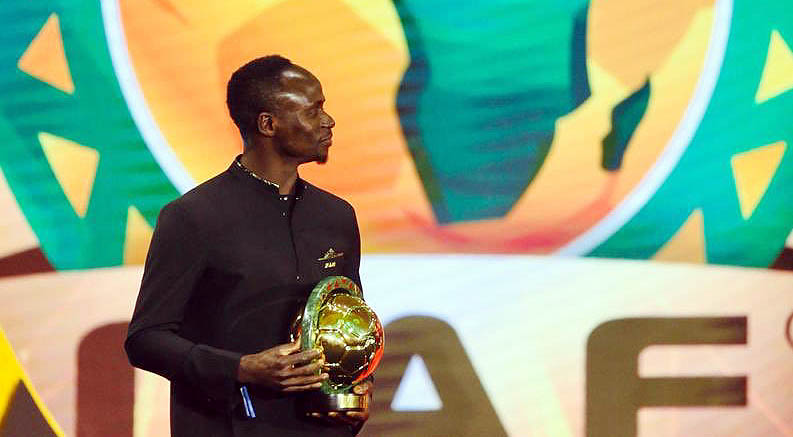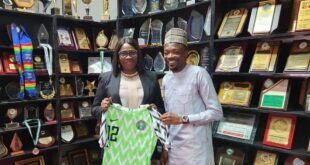After 30 years of hurt, Liverpool Football Club are – to use a phrase coined by former Manchester United Manager, Alex Ferguson – “back on their perch”. Last week they were crowned English Premier League champions basically with their legs on the sofa. They were confirmed winners after Chelsea Football pipped Manchester City 2-1 which ensured Liverpool had an unassailable 23 point lead. It ends the chase of what their supporters regard as “The Holy Grail” after nearly two generations. Their recent success would not have been possible though without the influence of some of Africa’s finest footballers. Our Contributing Editor, Michael Nnaji, himself a die-hard Liverpool fan, chronicles the pivotal events leading to League Glory.
After several misses, Liverpool finally have their hands on the coveted Premier League Trophy. With their recent victory, they are now just one title away from drawing level with their bitter local rivals, Manchester United who are on 20 League Titles.
It has been a long time coming for Liverpool, the Meseyside Club, a club venerated by the Scousers who populate the North West county.
Their road to League Glory could be said to have begun with the appointment of their German manager, Jürgen Klopp, in October 2015. For starters, Klopp had a clear idea of how he wanted football to be played. His pedigree in Germany, where he faced down the Bayern Munich juggernaut, winning two Bundesliga titles in the process, bears testimony to this.
First, he set about rooting out players he considered surplus to requirement. With the backing of the club, an innovative data-driven player recruitment was set in motion to identify and acquire players that fitted into their playing template. “Kloppism” is a brand of football that is a highly refined, skilful, powerful and physical football that is played at break-neck speed.

It also demands high tactical awareness from the players who must possess astonishing stamina to implement “Gegenpresing” – the willingness to win the ball back as soon as it is lost to the opponent (preferably near the opposition goal) and initiate an attack. Klopp himself has referred to this system as the “best playmaker” in football, basically declaring the revered No. 10 role obsolete.
Enter Mohammed Salah (Egypt), Saidio Mane (Senegal), Naby Keita (Guinea) and Joel Matip (Cameroon). These are players of African descent who were painstakingly recruited during the aforementioned period and who have significantly contributed to the Liverpool success story. In the past 13 months alone, Liverpool have won almost every major title up for grabs. These include the UEFA Champions League, the UEFA Super Cup and the World Club Cup. And now the Premier League, which they have craved for 30 odd years.
Last season ended in a bitter-sweet fashion for Liverpool. They missed out on the Premier League title by a single (!) point to relentless rivals, Manchester City, but made up for it with UEFA Champions League glory. That disappointment obviously served as motivation for the current season, with Liverpool quickly off the blocks and setting the pace. By the time I write this, they were ahead of their nearest rivals (Manchester City) by a whopping 23 points, with 7 games to go – an English record. This is testament to the character and never-say-die attitude their German manager has instilled into this group of players. Other teams would have floundered after such a huge disappointment. Not this team.
The Egyptian Salah has especially shone since his transfer from AS Roma in 2017 for a 36.9 million pounds. In his first season, he scored an astonishing 37 goals winning the Golden Boot (for the highest goalscorer) and was voted Player of the Year in England as well as Africa’s Footballer of the Year. He has since remained Liverpool’s top scorer in every season since he joined the club. At the last count he had scored 71 goals in 101 appearances for the club, some of them pure works of art. He has since grown in popularity, especially in the Arab world as evidenced by his rapturous reception at the World Club Cup held in Qatar in December 2019.
Mane, on the other hand, joined from Southampton for 34 million pounds, and immediately hit the ground running, scoring in every other game since joining in 2016 (60 goals in 120 games). His partnership with Salah and the Brazilian, Roberto Firmino, is regarded as one of the most feared forward lines in world football. Since they started playing alongside one another, they have scored a whopping 146 goals for the club.
Last season Mane was voted Africa’s Best Football and came fourth at FIFA’s World Player of the Year. That the great Argentinian, Lionel Messi, cast his own vote for Mane tells you the rarefied level at which Mane operates these days. He is have even “patented” a goalscoring route to goal – the burst of pace from around the centre circle, leaving defenders trailing in his wake, the opening of his body and the inevitable strike at the far corner of the post. He is not just two-footed but is also deadly in the air, a complete footballer, if ever there were one.
Keita, the Guinean, who joined from Red Bull Leipzig in 2018 has rather experienced a stop-start career since signing for the club, his involvement in the first team hampered by injuries. But there is no doubt in and outside the club of his extraordinary talents. He has, nevertheless, chipped in with some wonderful displays and it is hoped that he will be firing on all cylinders in the near future.
While Liverpool paid a princely sum of 49 million pounds to acquire the services of Keita, Matip represents a real bargain. A free transfer from the Bundesliga’s Schalke 04, he has grown from strength to strength since arriving in 2016. His partnership in central defence with the elegant Dutchman, Virgil van Dyke, ensured that Liverpool FC made it all the way to last season’s UEFA Champions League where they held out to beat fellow English club Tottenham Hotspurs and win the title for the sixth time in their history (an English record).
Judging from the trajectory of these African players, it is clear to see that were integral to a clear-eyed long term plan, the essence of which is to conquer and dominate English Football for a period of time.
One common thread running through all four aforementioned African footballers is their humble beginnings. Salah himself has recounted how he used to drive miles to attend football training, driven in old, rickety vehicles and the sacrifices his parents made to ensure he succeeded in his chosen trade. Some had no football boots to wear and mostly played barefoot (Keita).
Mercifully, these football icons have not forgotten their roots, donating hundreds of thousands of euros to their local communities and setting up Charity by way of giving back for the Common Good. They are, in the process, blazing a trail for upcoming African footballing stars. Long may it continue.
For now, the city of Liverpool is being painted red. No little thanks to their “friends” from Africa.
Dr Michael Nnaji lives in Berlin, Germany
 THE AFRICAN COURIER. Reporting Africa and its Diaspora! The African Courier is an international magazine published in Germany to report on Africa and the Diaspora African experience. The first issue of the bimonthly magazine appeared on the newsstands on 15 February 1998. The African Courier is a communication forum for European-African political, economic and cultural exchanges, and a voice for Africa in Europe.
THE AFRICAN COURIER. Reporting Africa and its Diaspora! The African Courier is an international magazine published in Germany to report on Africa and the Diaspora African experience. The first issue of the bimonthly magazine appeared on the newsstands on 15 February 1998. The African Courier is a communication forum for European-African political, economic and cultural exchanges, and a voice for Africa in Europe.




